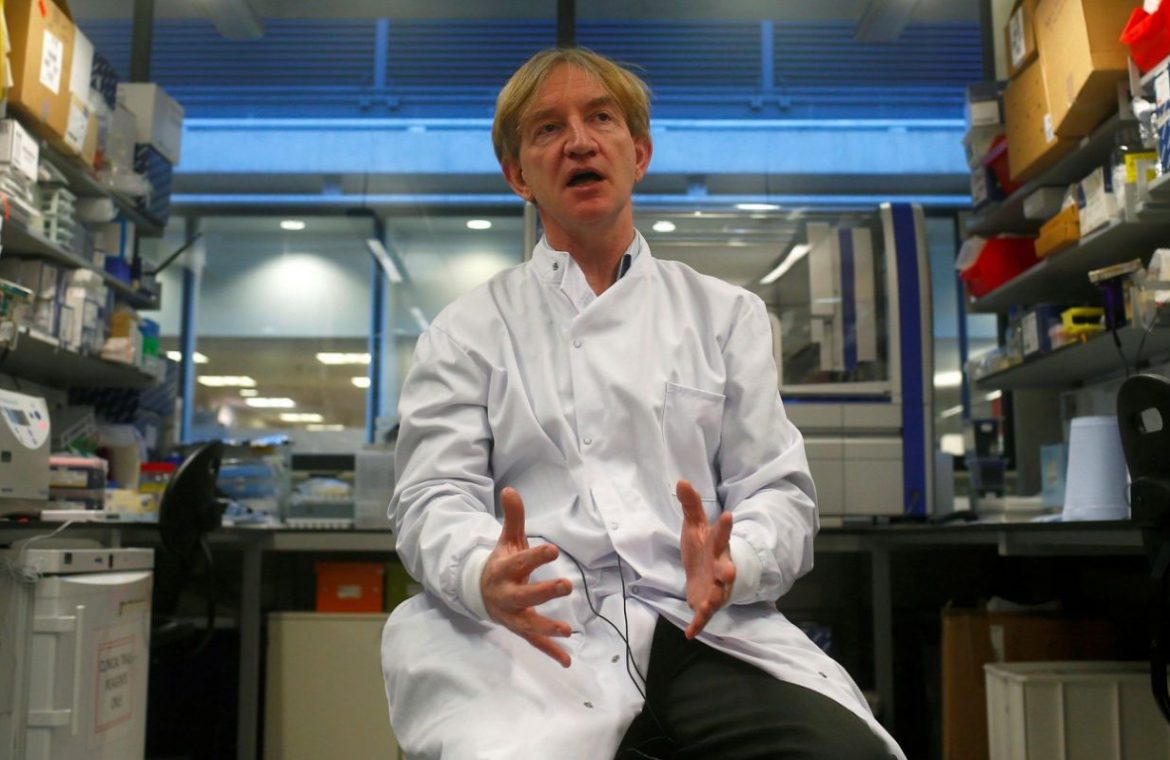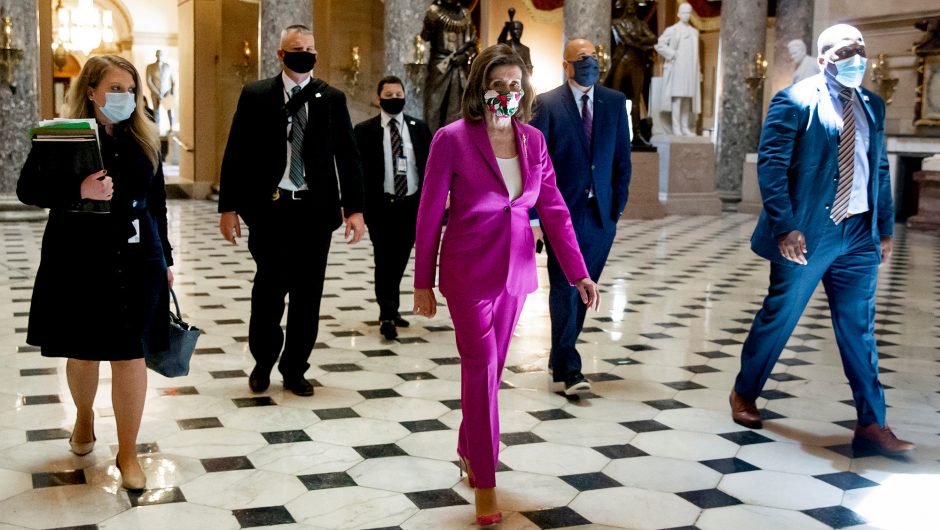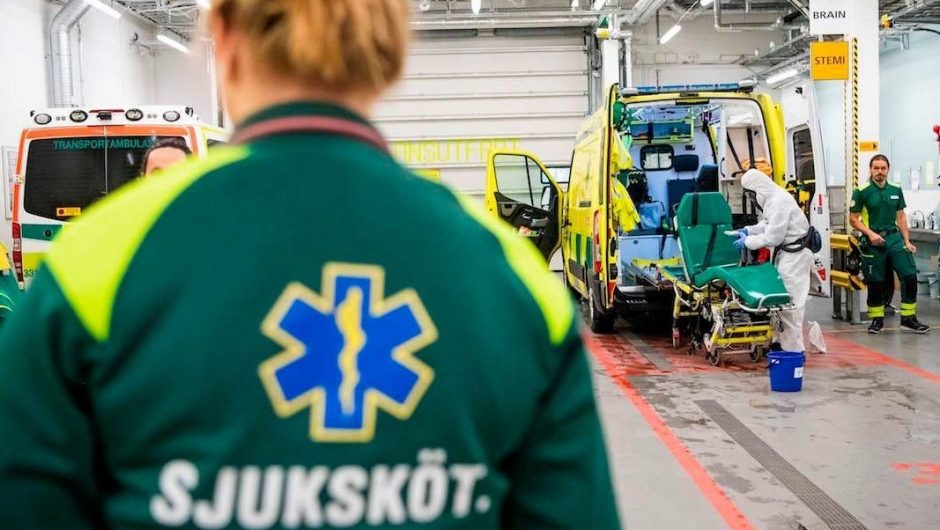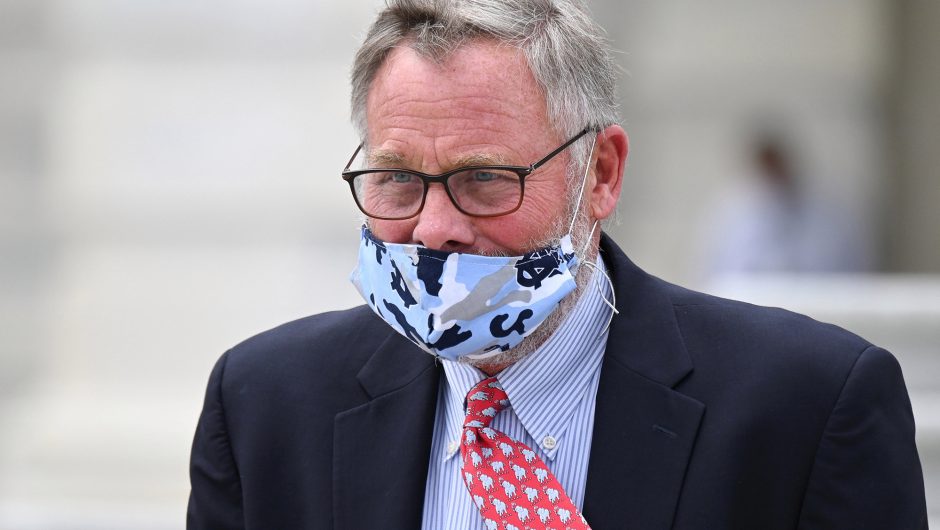Professor Adrian Hill – Oxford University Covid-19 vaccine trial has only 50 per cent chance of success because virus is disappearing so fast – REUTERS
It began in January as a “little lab project” after a curious new disease emerged in China.
Little more than four months later, the eyes of the nation – and perhaps the world – are firmly upon Professor Adrian Hill and his team at Oxford University.
This week, the pharmaceutical giant AstraZeneca announced a $1.2 billion deal with the US government to produce 400 million doses of the unproven coronavirus vaccine first produced in Prof Hill’s Oxford lab.
Meanwhile, the British Government has agreed to pay for up to 100 million doses, adding that 30 million may be ready for UK citizens by September.
The stakes could hardly be higher. If proven effective, the ZD1222 vaccine would allow people to leave their homes, go back to work, and rebuild the economy.
But Professor Hill, director of the university’s Jenner Institute, revealed that his team now faces a major problem, throwing the September deadline into doubt.
In short, their adversary is disappearing so rapidly in the UK that the next phase of trials has only a 50 per cent chance of success.
Without Covid-19 spreading in the community, volunteers will not catch the disease, leaving scientists unable to prove that their vaccine makes any difference.
Professor Hill said that of 10,000 people recruited to test the vaccine in the coming weeks – some of whom will be given a placebo – he expected fewer than 50 people to catch the virus. If fewer than 20 test positive, then the results may be useless, he warned.
“It is a race, yes. But it’s not a race against the other guys. It’s a race against the virus disappearing, and against time,” Professor Hill, 61, told the Telegraph from his university laboratory, long emptied by the lockdown.
“We said earlier in the year that there was an 80 per cent chance of developing an effective vaccine by September.
“But at the moment, there’s a 50 per cent chance that we get no result at all.
“We’re in the bizarre position of wanting Covid to stay, at least for a little while. But cases are declining.”
Story continues
At the Downing Street press conference on May 17, Business Secretary Alok Sharma suggested half the UK population could be given the jab this autumn, should it prove effective.
But Prof Hill said success was far from guaranteed, and warned against “over-promising”.
“I wouldn’t book a holiday in October on the back of these announcements, put it that way,” he said.
“The number keeps going up. Thirty million doses is quite hard, and one hundred million is harder still by September. Remember, even if we get a result in August, we can’t start vaccinating everyone the next day.”
“There’s a danger of over-promising here. This is the way I usually say it: this is our ambition. There are multiple risks. It’s never been done before. We don’t know if we can do it. We think we can.
“You know, mistakes happen. Accidents happen in cooking as well. That needs to be understood.”
Early next month, Oxford will release the crucial results of a first trial of more than 1,000 UK volunteers conducted in April, when the disease was at its peak.
“The first trial is going fine. We’re still in business, I can tell you that,” Prof Hill said.
“But we’re not going to do what others have done – say we’ve got something good, but we’re not showing you yet. That’s just bonkers. You either disclose your results or you don’t.”
Around the world, eight potential Covid-19 vaccines have gone to human trials: four in China, two in the US, and one in Germany. Many of those teams – including Oxford – are planning to move their next trials to Covid-19 hotspots overseas, but that will take time. The Oxford team has already arranged further trials in the US, and are in talks with other countries where the virus is still spreading.
“You think we’ve got a problem?” Prof Hill said. “What would you do if you were in China? There are three Chinese companies looking for phase three and there’s no Covid in China. So what do they do?”
The Oxford team had a strong head start on their rivals. Most of the other scientists searching for a vaccine across the world have been forced to hold small clinical trials to prove their treatment is safe. But the Jenner Institute already had a vaccine tested against an earlier coronavirus, which was proven to be harmless to humans.
The technique grew from Prof Hill’s search for a vaccine to combat malaria, a scourge he first witnessed in the 1980s while visiting an uncle working as a priest in a war-torn part of modern Zimbabwe.
Over the past two decades, the Jenner Institute learned how to alter the genetic code of a familiar virus, first to neutralise its harmful effects, and then to make it imitate a deadlier disease. Injected into the bloodstream, the harmless virus can induce the body to produce an immune response, providing long-lasting protection.
Prof Hill’s long search for a viable malaria vaccine has so far been fruitless, despite more than 70 clinical trials. But last year, his colleague Professor Sarah Gilbert modified the same chimpanzee virus to vaccinate against MERS, a coronavirus, which then passed human trials in the UK.
When Covid-19 began to spread, Prof Gilbert decided to do a “little lab project” to see whether the Oxford technique could work on the new disease. Tests were promising, and in April six rhesus macaque monkeys were given single doses of the Oxford vaccine at a US lab, and were then exposed to the virus. A month later, all six monkeys were still healthy.
If the next phase of human trials is a success, the Government has pledged that “people in the UK will get the first access, helping to protect thousands of lives”.
Next in line will be the US government, which has secured 300m doses to protect its own citizens, under Donald Trump’s so-called ‘Warp Speed’ programme.
But Prof Hill said Oxford University had secured “hardwired” assurances against so-called ‘vaccine nationalism’ – the prioritisation of treatment toward rich Western nations at the expense of others.
“The reputational damage to the university would be enormous if we provided the vaccine only for the UK and US and not for the rest of those countries of the world where it’s very likely the pandemic would still be raging,” he said.
“I’ve been thinking about it day and night for weeks. We care about Africa. We know the people there. We know there’s going to be a significant problem at some stage. Brazil looks terrible and India is getting there fast.
“The vaccine should be supplied to the countries of greatest need at the moment that it works, rather than the countries who got there first. And that will happen.”
A deal has already been signed with the Serum Institute of India, the world’s largest vaccine producer.
If the Oxford vaccine works, Prof Hill said he would be happy for other countries to use his research principles to protect their own citizens.
“We might feel a little peculiar about that. We got there first, but everyone else piles in. We might feel that we’ve done the heavy lifting.
“But actually we wouldn’t care. We’re not competing in a cutthroat way. If someone else can produce a billion doses, we’ll have a party.”
Despite the billion dollar price tag, Oxford will not be making vast amounts of money from the breakthrough, Prof Hill insisted.
“Simple arithmetic will tell you that there’s no money being made by the university. It’s pretty amazing that it can be manufactured at that selling price. We’re coming clean and saying: during the pandemic, we will not make money.”
Until last week, the Oxford vaccine was considered the clear frontrunner in the global race. Last week, however, a widely-reported article in Forbes cast doubt on the results of the monkey trial, suggesting that results actually showed the vaccine did not prevent the animals from catching or spreading the virus because traces were found in the creatures’ noses.
Prof Hill said the article was misleading because the monkeys had been deliberately “overdosed” on coronavirus in order to test for safety.
“The honest truth, I think, is that the author is a long-retired senior Harvard virologist, infectious disease guy. He’s not a vaccine developer,” he said.
“We used a really high dose and these guys gave it not just into the lungs and the nose. They gave it into the mouth, and they gave it into the eyes. They gave a huge dose. I mean, seriously, it’s that level of basic.”
Even so, Prof Hill accepts the chances of success still hang firmly in the balance.
“The US government, the UK government, loads of charities and philanthropists are all saying we’ll pay to have it manufactured, before you finish the trial. I mean, it’s a huge kind of vote of confidence in what we’re doing. It’s really flattering,” he said.
“But that doesn’t guarantee the result. It could be nothing or could be great or somewhere in between.
“We’re conflicted. We believe in our technology, and I suppose we’re more likely to overestimate than underestimate.
“We try to be as objective as we can, but we spent 16 years developing this technology. If it suddenly looks like it might be useful to the whole world, you really want it to work.”








